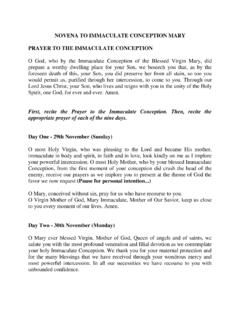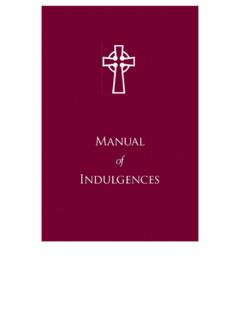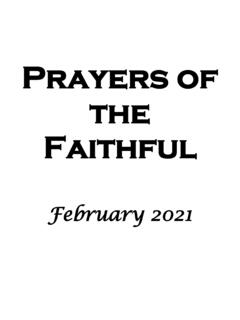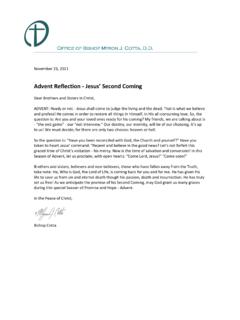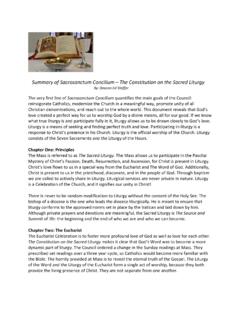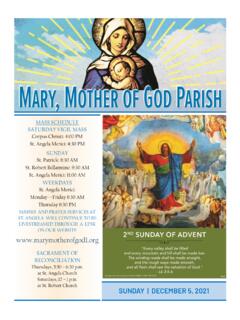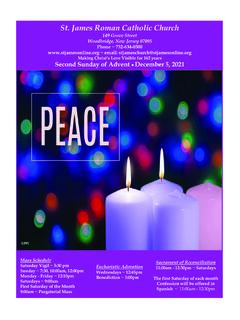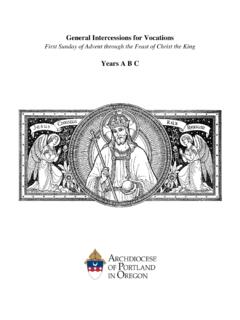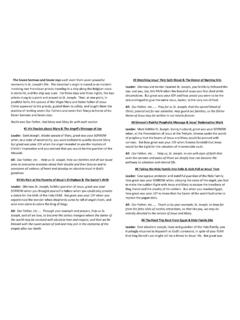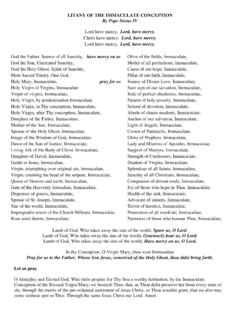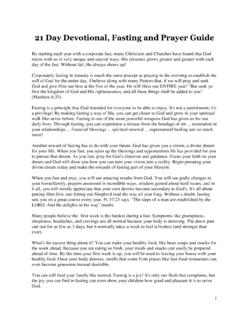Transcription of The Order of the Mass and Our Responses
1 THE Order OF THE MASS & OUR Responses 1. Introductory Rites *Entrance: Make an effort to sing even though you may not enjoy singing. If you are unable to sing , follow the words of the song and reflect on how they challenge you to change or comfort you. Our singing together helps to form us into one assembly that together gives thanks & praise to God. *Greeting Priest: in the name of the Father, and of the Son, and of the Holy Spirit. Assembly: [Make the Sign of the Cross] Amen. Form A Priest: The grace of our Lord Jesus Christ, and the love of God, and the communion of the Holy Spirit be with you all. Assembly: And with your spirit.
2 Form B Priest: Grace to you and peace from God our Father and the Lord Jesus Christ. Assembly: And with your spirit. Form C Priest: The Lord be with you. (Bishop: Peace be with you.) Assembly: And with your spirit. *Penitential Act: During this time, make an effort to recall moments when your thoughts, words and/or actions might have kept you or you prevented someone else from being the person God created you/them to be. Identify a specific word, thought, or action that created an obstacle between you and God and ask for forgiveness. Form A (Confiteor) (Though it may be used at any time, at St. Luke we use this form during Advent & Lent.)
3 All: I confess to almighty God and to you, my brothers and sisters, that I have greatly sinned, in my thoughts and in my words, in what I have done and in what I have failed to do, [all strike their breast] through my fault, through my fault, through my most grievous fault; therefore I ask blessed Mary ever-Virgin, all the Angels and Saints, and you, my brothers and sisters, to pray for me to the Lord our God. Form B (Though it may be used at any time, at St. Luke we use this form during Ordinary Time.) Priest: Have mercy on us, O Lord. Assembly: For we have sinned against you. Priest: Show us, O Lord, your mercy.
4 Assembly: And grant us your salvation. Form C (Though is may be used at any time, at St. Luke we use this form during Christmas & Special Celebrations) *Priest: You were sent to heal the contrite of heart: Lord, have mercy. Assembly: Lord, have mercy. *Priest: You came to call sinners: Christ have mercy. Assembly: Christ have mercy. *Priest: You are seated at the right hand of the Father to intercede for us: Lord, have mercy. Assembly: Lord have mercy. This portion is the same for all 3 Penitential Acts Priest: May almighty God have mercy on us, forgive us our sins, and bring us to everlasting life. Assembly: Amen.
5 The Kyrie (Lord, Have Mercy) [the act or process of petitioning for help or support] follows, unless Form C is used. Minister: Lord, have mercy. Assembly: Lord, have mercy. Minister: Christ, have mercy. Assembly: Christ, have mercy. Minister: Lord, have mercy. Assembly: Lord, have mercy. *Gloria (or Glory to God - omitted during Advent and Lent) Glory to God in the highest, and on earth peace to people of good will. We praise you, we bless you, we adore you, we glorify you, we give you thanks for your great glory, Lord God, heavenly King, O God, almighty Father. Lord Jesus Christ, Only Begotten Son, Lord God, Lamb of God, Son of the Father, you take away the sins of the world, have mercy on us; you take away the sins of the world, receive our prayer; you are seated at the right hand of the Father, have mercy on us.
6 For you alone are the Holy One, you alone are the Lord, you alone are the Most High, Jesus Christ, with the Holy Spirit, in the glory of God the Father. Amen. *Collect: At this time the Priest calls upon the people to pray and everybody, together with the Priest, observes a brief silence so that they may become aware of being in God s presence and may call to mind their intentions [our determination to act a certain way]. The priest then collects these individual prayers with one spoken prayer. Gloria: Set everything aside during this time for a moment, and praise God for something specific (His guidance, mercy, wisdom, etc.)
7 * Form C: Note that other tropes (the words of the priest or deacon) can be used. Note: During Easter we use the Sprinkling Rite in place of the Penitential Act. THE Order OF THE MASS & OUR Responses 2. Liturgy of the Word Take time during the week to read over and reflect upon the upcoming Sunday s readings. The Word of God needs an opportunity to exist in our minds where it will grow in strength and start to take root in our hearts. * First Reading: Comes form the Old Testament except for during the Easter Season when it comes from the Acts of the Apostles & some special feasts when it comes from the Book of Revelation.
8 * Responsorial Psalm: The Psalms are sung and taken from the Old Testament. We respond with the refrain when the cantor s arm is raised (cue for us to respond). *Second Reading (on Sundays and solemnities): Comes from the New Testament taken from the letters of the apostles to the early Christian communities. Response to the Biblical Readings First and Second Reading (at Conclusion) Reader: The Word of the Lord. Assembly: Thanks be to God. *Gospel Acclamation: At this time the gathering of the faithful welcomes and greets the Lord who is about to speak to them in the Gospel and profess their faith by means of the chant.
9 It is sung by everybody, standing, and is led by the choir or a cantor. Assembly: Alleluia! Note that we do not sing/say alleluia during Lent. We sing other words of praise instead. *Gospel: A reading taken from the book of Matthew, Mark, Luke, or John from the New Testament and proclaimed every three years. We use the Gospel of John during Easter. Gospel (at Introduction) Deacon, or Priest: The Lord be with you. Assembly: And with your spirit. Deacon, or Priest: A reading from the holy Gospel according to N (name of Gospel writer). Assembly: Glory to you, O Lord. Gospel (at Conclusion) Deacon, or Priest: The Gospel of the Lord.
10 Assembly: Praise to you Lord, Jesus Christ. *Homily: At this time the Priest or Deacon take time to reflect on the readings of the Mass. They often help relate the readings to how they apply to our own lives. Listen and meditate on their words. Often God takes this time to relate something to you through a single phrase. Listen and be attentive. *Profession of Faith (on Sundays, solemnities, and special occasions; on the Solemnity of the Nativity of the Lord we kneel where bow is indicated.): This is where we proclaim our faith [what we believe in] as individuals and as a united community. Recite the Nicene-Constantinopolitan Creed (Nicene Creed or Apostle s Creed) (We recite the Creed in a Q/A format on Easter Sunday & at any Mass with a baptism.)
